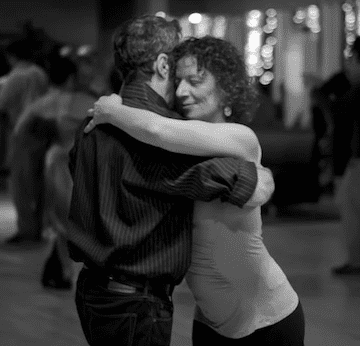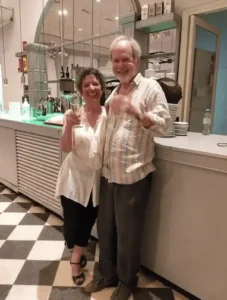Spanish is Darlene’s Superpower
Imagine learning Spanish as a way to enhance your experience of one of your great passions in life. This is exactly what Darlene, a retired massage therapist living in the Pioneer Valley has chosen as a path. Darlene has taken her dedication to and love of Argentine Tango a step beyond by learning Spanish. She wants to be able to converse with her partners while dancing at Tango events around the world and to both feel and understand the lyrics to the songs that inspire her movements on the dance floor.
Could you just tell us a bit about yourself and your experience learning Spanish, and other languages.
and your experience learning Spanish, and other languages.
I am focusing on my Spanish now, but I have a smattering of other language skills. And in fact, I love language. Language is one of the things that I find really fascinating to study. Somebody once asked the question: if you had a superpower, what would it be? I think most people would answer flying or invisibility or something along those lines. For me, my superpower would be to understand every language on the planet, because then I would get to understand people, and be able to communicate with everyone. I think that would be an amazing thing to be able to do. At this point, I’m satisfied with the chance to chat with someone in a few languages. I can say things like: Hi, how are you? Or, what did you do yesterday? Do you want to go for coffee? It’s a start!
I actually taught English as a second language with a program that was run on the computer with students from all over Europe. This was a long time ago. I would sit there and actually speak to them on the phone. The students that I worked with had a high level of English speaking ability. I have actually maintained friendships that I made through that. But talking to people from around the world was an amazing thing. And being an ambassador for the other face of America, not the one that is slammed in their faces through the media and in film, made me feel really good. So I understand what it’s like from both sides of the learning process.
How long have you been taking Spanish or other language classes at ILI?
I can’t remember exactly when my husband and I started Spanish. As a wild guess, I’d say it’s been four years since we took our first class. It was an intensive class. Then we didn’t do anything for months, but took another intensive and then took a beginner class. We have taken classes on and off again for a number of years.
How did you hear about ILI?
We moved here from upstate New York 10 years ago. Originally we took a Spanish class through Amherst Leisure Services, and someone in that class mentioned ILI, and we went from there. So the original connection to ILI was being out in the community; it was word of mouth.
My husband also took classes up until very recently at ILI and we were so grateful for finding ILI. I cannot tell you how wonderful an institution it is for us, or how much we want to support it because of the good It does.
Why did you decide to focus on Spanish?
A big part of why I wanted to learn Spanish was my dancing. My husband and I both dance Argentine Tango. We’ve been dancing for 15 years already. We were listening to tango music all the time. And I felt like it would really be great to understand the lyrics that I’m dancing to.
 We travel all over the world for tango. It’s a social dance. We’re not talking about performance, we’re not stage dancers. We’re really just social dancers. So we’ll go to a dance together — It’s called the Milonga, and he and I will dance. Then after a time, we will say ‘See you later’, and go off and dance with other people. We’ve made friends everywhere — in Spain, France, the Netherlands, other places in Europe, and all over the US, and Canada.
We travel all over the world for tango. It’s a social dance. We’re not talking about performance, we’re not stage dancers. We’re really just social dancers. So we’ll go to a dance together — It’s called the Milonga, and he and I will dance. Then after a time, we will say ‘See you later’, and go off and dance with other people. We’ve made friends everywhere — in Spain, France, the Netherlands, other places in Europe, and all over the US, and Canada.
Of course, the Mecca of Argentine Tango is Buenos Aires. And we’ve been there quite a number of times. I wanted to also be able to talk to the people there and be able to enjoy the dance structure including the social aspects.
For example, at a dance, you’ll meet a dance partner and you’ll agree to a Tanda. Tanda is a set of three or four songs that have a similar pattern, either it’s rhythmically similar or the orchestra is the same. And you’ll dance those three or four songs with that one partner. In between songs, there’s a little bit of a break and it’s very polite to chat. In the beginning, you don’t just jump into the dance. You let the music sort of build inside you until you’re ready. And you chat during that period of time.
I really wanted to be able to chat. I wanted to be able to be pleasant with people and understand who I’m dancing with in Argentina.
Did you learn Spanish online or face to face? Which did you prefer?
I have actually taken both online and face to face classes at ILI. About two years ago, a group of us had been continuously in the same class. We were able to ask for a specific time for our group, so a class was created for us for an afternoon session. That class was taught by Samira. Because we became a core group, we were able to move along together. And although there’s a different level of ability within the group, when the pandemic hit and face to face classes were not safe, we continued by moving online. We decided that zoom would be better than nothing.
I totally agree that if I had not done online classes, I probably would have lost much of my ability in the language. It helped me maintain the ability to communicate with my Spanish.
Now that I have done both, I would say in person classes are hands-down way better for me. I’m comfortable doing Zoom classes, but the immediacy of in person classes helps me hold information better. I’m a tactile learner. So I’ll write down things in class, but if I’m writing them in class in person and seeing the teacher write them, and hearing the subtleties that I can’t pick up on Zoom, it reinforces the learning process for me. Although I have read books online, I’m also the kind of person who reads paper books. I’m just old fashioned, I guess. I like the reality of face to face class. I was very grateful for the social aspect of having Zoom classes, because we were locked in quarantine. Now I’m retired — I retired just a few months before the first lockdown in August of 2019. While we were in lockdown, we went hiking and cross country skiing — so we were out in the world, but Zoom classes gave us a social outlet that we wouldn’t have had. Zoom was very useful in that way, but from the learning language point of view, I didn’t feel it was successful for me.
What aspects of learning Spanish did you struggle with the most?
Memory is one of the most challenging aspects of learning Spanish for me. In our class, we’re learning different tenses now. So we’re working on the subjunctive and different forms of past tense. Keeping everything straight is a challenge. I can read and write better than I can speak.
Speaking is coming more slowly for me. I’d say the challenge is mostly how much time I’m devoting to my Spanish. That time spent always determines how much I’m going to hold on to and how much I’m going to improve.
I feel that I have met the goal that I originally set out to achieve. When I first started studying Spanish. I said, “I want to be able to chat with my dance partners in Spanish and to know what the songs are about,” I can do that now.
What aspects of learning Spanish came more easily for you?
Genders in Spanish are not a problem, which is surprising, because I always had problems with that in French. For some reason in Spanish. I catch it and I learn it right away. My strategy is to learn the gender together with the noun. For example, instead of only saying “clase,” I’ll put it together and say “la clase.”
I think it also helped that I grew up in New York City, and Spanish language is all around in the city. Even though I didn’t learn Spanish at the time, I’m sure my ears were picking up the sound of the language. And I think that has made it a little easier. I also studied Hebrew from the time I was six. So again, my brain was accustomed to learning language. I studied French in high school. Then I studied Italian and German In college. I studied French again in my adult years, because my husband’s work took us to Paris frequently. So my brain and my ears are sort of ready to take language in.
How long did you need to speak Spanish fluently?
I think confidence is the key. Whether I speak fluently or not isn’t even the question. It’s more that I feel like I can hop into a cab in Buenos Aires and just strike up a conversation with the driver, knowing full well that I am not using proper language, or proper verb conjugation, but it doesn’t matter because we’re communicating. When we were on a trip to Buenos Aires, I was able to do just that: to get into a cab and just start talking. And apparently, I said things well enough to be understood because we got where we needed to go.
Have you ever had to put into practice your Spanish speaking skills in the US? Or abroad?
When we were traveling around Mendoza, an area that we weren’t familiar with we needed to ask for directions, and be able to understand what was being said. I used my Spanish then. The same thing happened in Puerto Rico. We went to Puerto Rico about four years ago. We used Spanish to ask for directions or to ask to find the food trucks. So pretty early on having Spanish skills had a practical use.
More recently, I had the opportunity to use my Spanish skills here at home. I was volunteering at a vaccination site in Amherst and two women came for their appointment. They were Spanish speaking and spoke no English. I was able to help them, talk to them in Spanish and give them directions about how to proceed, where to go and so on – it felt great!
In addition, my husband speaks French quite fluently. And he knows a woman from Paris who lives half of the year in Paris and half of the year in Buenos Aires. We’ve met up with her in both places, but she can’t speak with me because my French skills are very limited. When we were in Buenos Aires, she would talk to George in French and then I would talk to her in Spanish.
And this happened with another couple of people. We’d have three way conversations, but all about the same thing in three different languages. And it was immensely helpful for me to have Spanish skills to be able to make my thoughts clear.
Do you have any travel plans for the future?
As soon as things open up again, we’re going back to Buenos Aires. And we have another plan to go to Tenerife, which is a Spanish island off of the African continent. We plan on going to a Tango event there.
We’re also considering doing a hike of the Camino de Santiago and doing it from Portugal, up into Spain. I don’t think I’ll learn Portuguese between now and then, but I suspect the Spanish will help. Of course, once we’re in Spain, it will be useful.
Is there anything that stands out to you about your ILI classes?
I’ve had good experiences studying language, and am very lucky to have had good teachers. What stands out for me about ILI teachers in general, is how comfortable they make me and the class feel in the language learning process. It can be very daunting to be confronted with feeling like a child; not knowing how to say something and looking foolish. But no teacher has ever made it anything less than perfectly comfortable to be in that state of unknowing, which I appreciate tremendously.
At ILI I can be comfortable enough to not know until I do know or understand. There’s never been anyone’s agenda for me, ILI’s agenda is to present what’s available, and find the best way possible to reinforce the learning.
The teachers always draw on all sorts of resources to make it possible for you to learn new things. For example, we are working with Brenna now, and if I have a question about something, I’ll say, ‘Brenna, I saw this online. Can you explain it?’ She’ll explain it, and then she’ll find resources and post them so that I’ll get another source to understand. The devotion from the teachers to helping students is profound.
Beth was our first teacher. She was wonderful. It was so hard to move on from Beth, because she was our beginner Spanish teacher. And oh, my goodness, she made it all feel possible. Like, yes, you can do this! But then moved on and we had Samira as our teacher and she was also amazing! When you come to Spanish class at ILI, where you are at in your language learning journey is fine. That’s it. It’s that simple. There’s no comparison to other people. You have a goal to move to another place. And it’s the teachers who really give that comfort to allow that process to happen.
Would you recommend that others learn Spanish? And why?
I think there are any number of languages that could be useful to learn. I would say it would be useful to learn Spanish.
We have such a large population of Spanish speaking people coming into this country and many who are actually here already. For example, Holyoke Massachusetts has a large Puerto Rican population, so Spanish is all around us in our local communities.
How has ILI changed your perspective?
I think about the impact that ILI has on the community who are coming to the school to learn English, and see it as a wonderful resource. It’s not just about language, there’s a whole support system in place, and I appreciate that that exists here. I’m grateful that I live in an area where that exists, where there’s a mindset of wanting to provide this for the community.
My interaction with Heather from ILI has always been so positive. All of the staff — not just the teachers, really go out of their way to help us by accommodating our needs and working with us. So I can only imagine how that is for people who rely on ILI as a resource. A place for learners to have a safe space, and to be able to reach toward belonging or making their way into the world and community here is something that I really appreciate.
Thanks for your time, Darlene. It’s been fun talking to you.
Thank you! Learning language is wonderful. My advice is to pick a language that you are interested in and go for it! I want to continue with my language learning and get better and better at Spanish. I figure learning languages has gotten me this far in life, I might as well just enjoy learning more and more.
Related Articles
- Top 7 reasons to learn and speak Spanish fluently in the USA
- Kathy Learning Spanish (again): Interview with a Spanish language student living in the USA
- The rejection of perfection in language learning
- A guide for beginners on how to learn Spanish
- Our top 4 destinations to learn Spanish abroad
- 4 Great Reasons Why You Should Learn Spanish in the USA

 and your experience learning Spanish, and other languages.
and your experience learning Spanish, and other languages.